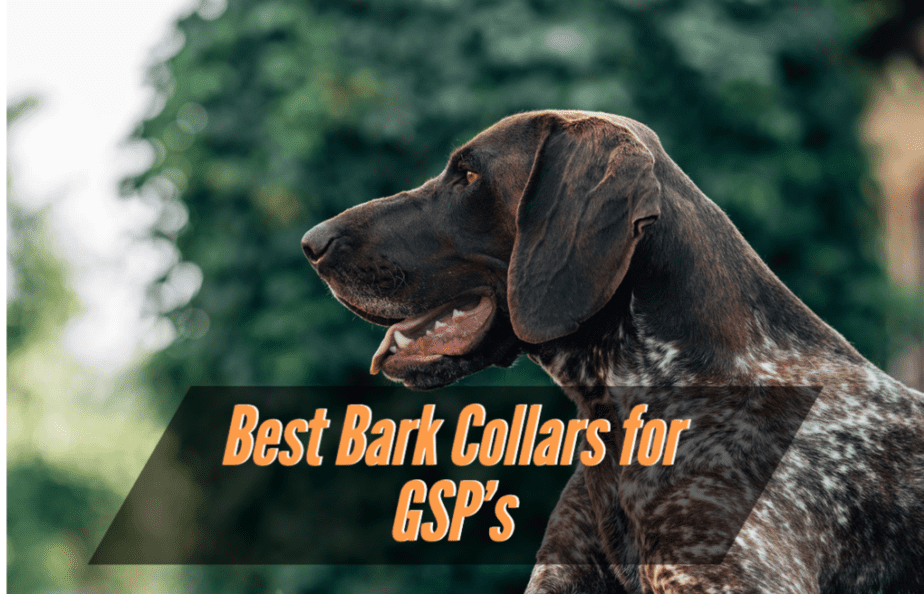The German shorthaired pointer (GSP) is an excellent hunting dog with an equally impressive voice.
These dogs are known for their loud bark, which they use to alert their owners of intruders and when they’ve located game.
If your dog spends most of its time outside on your property, you may not need a bark collar at all.
But if your property is surrounded by neighbors, or if you’re dealing with territorial barking, it might be worth investing in one.
There are many bark collars available to purchase, but some may be more dangerous than others.
There are many factors to consider when selecting the best bark collar for your GSP, which can make finding one that’s safe to use a daunting task.

What Are Bark Collars?
A bark collar is a device that’s used to curb excessive barking in dogs. When the dog barks, the collar produces an unpleasant sound or sensation to discourage the behavior.
The device stays strapped around the dog’s neck, but should only be left on when you don’t want the dog to bark.
Bark collars have been used by dog trainers and owners for years, and technology in some bark collars has developed well beyond providing a painful shock whenever the dog barks.
As technologies vary, so do the products available. So choosing the best one can be confusing if you don’t have a clear idea of what’s out there.
Are Bark Collars Humane?
Not all bark collars rely on pain as the deterrent for barking like they used to, but they still rely on some type of physical discomfort or unpleasantness.
The dog remains physically unharmed, but the bark collar still produces a negative impression on the dog.
Barking is a normal behavior for dogs, and bark collars discourage this behavior. This creates a sort of cognitive dissonance in the dog’s mind.
They’re confused as to why they’re being punished for doing something that’s so normal to dogs, and this can cause unnecessary anxiety and even aggression with repeated use.
Why Do I Need a Bark Collar?
If you have a German shorthaired pointer, then you may know that they are similar to other hunting breeds in that they are very excitable pets.
They need a lot of exercise and stimulation to be happy. These dogs are also notorious for barking excessively, which can put a damper on your relationships with your neighbors if you live in an apartment complex.
The GSP’s bark is useful in emergencies and when you’re out hunting, but it may be necessary to get a bark collar to help teach your GSP when it should and shouldn’t bark.
Things to Consider When Purchasing a Bark Collar
When it comes to dog training, there are a variety of different products and tools that you can use to discipline your dog.
One such product is the bark collar, which delivers a static shock to your pet when it barks. When you’re ready to purchase one for your dog, there are a few things that you should know.
What Are the Different Types of Bark Collars?
An ultrasonic bark collar is a battery-operated device that emits high-frequency sound waves to deter your dog from barking.
These bark collars use a microphone to sense when your dog is barking, and then emit a frequency which only your dog can hear.
Over time, your dog will begin to associate their sound with its barking, and learn to stop.
A vibrating bark collar uses a similar microphone detection system to tell when your dog barks, then it gently vibrates, letting your dog know that it shouldn’t be barking.
Shock bark collars have been around for the longest amount of time. All other bark collar designs were inspired by the shock collar, which is battery-powered, and sends a small electrical signal into the dog’s neck whenever it barks.
Shock collars are the least humane of all bark collars, as they actually cause the dog physical pain, and can lead to anxiety, fear, and aggression.
A spray bark collar is new technology. Instead of emitting a sound, shock, or vibration, it sends a small spray of citronella gas, letting the dog know to stop barking.
Citronella is harmless for dogs, as it’s made from a combination of various grasses (and it smells like citrus).
Bark Collars You Should Avoid
Bark collars are designed to prevent your dog from barking by delivering an unpleasant sensation when they bark.
The idea is that the dog will associate the unpleasant feeling with barking and learn to stop doing it.
Some dog owners have found that these collars don’t work for their dogs, even after months of use. That doesn’t mean they never work though.
They might get your dog to stop barking, but the psychological toll shock collars take is not worth it. Shock collars should be avoided, as they’re inhumane.
If you exhausted all of your options and are resorting to a shock collar, you should be sure that it’s high quality and well made.
Malfunctioning shock collars can do irreparable damage to your dog, so avoid those that are inexpensive or cheaply made.
The Best Bark Collar for German Shorthaired Pointers
With all things considered, the best bark collar for GSPs is one that’s multifaceted, of high quality, and ideal for short-haired dogs.
Sport Dog 425X Dog Training System
This is my personally owned option. I have used this dog training collar for Hanks entire life. Its waterproof and good for up to 500 yards of coverage (that’s 5 football fields).
Sport Dog built in a stand-alone bark controller option that allows either a tone, a vibration, or a dialed-in shock to correct your GSP’s barking when it occurs.
Whether you are hunting, out for a jog or need a barking control in place, this collar does it all.
Easy Educator Dog Training System
Now, if you just need a quick and easy option, the Easy Educator 1/2 Mile System is a great option.
The Easy Educator 1/2 Mile Dog Training System fits all of these criteria, as it provides five different modes of stimulation, it’s durable, has a remote control, works using an LCD display, and is highly rated.
Conclusion
Bark collars are a great option for anyone looking to train their dog, as they’re often built to be humane and effective.
They are an easy way to curb excessive barking in your home without having to pay for expensive training classes, but training classes should still be taken for best results.
Luckily, there are many different types of bark collars on the market today, and companies are striving to continue humane dog training practices.

